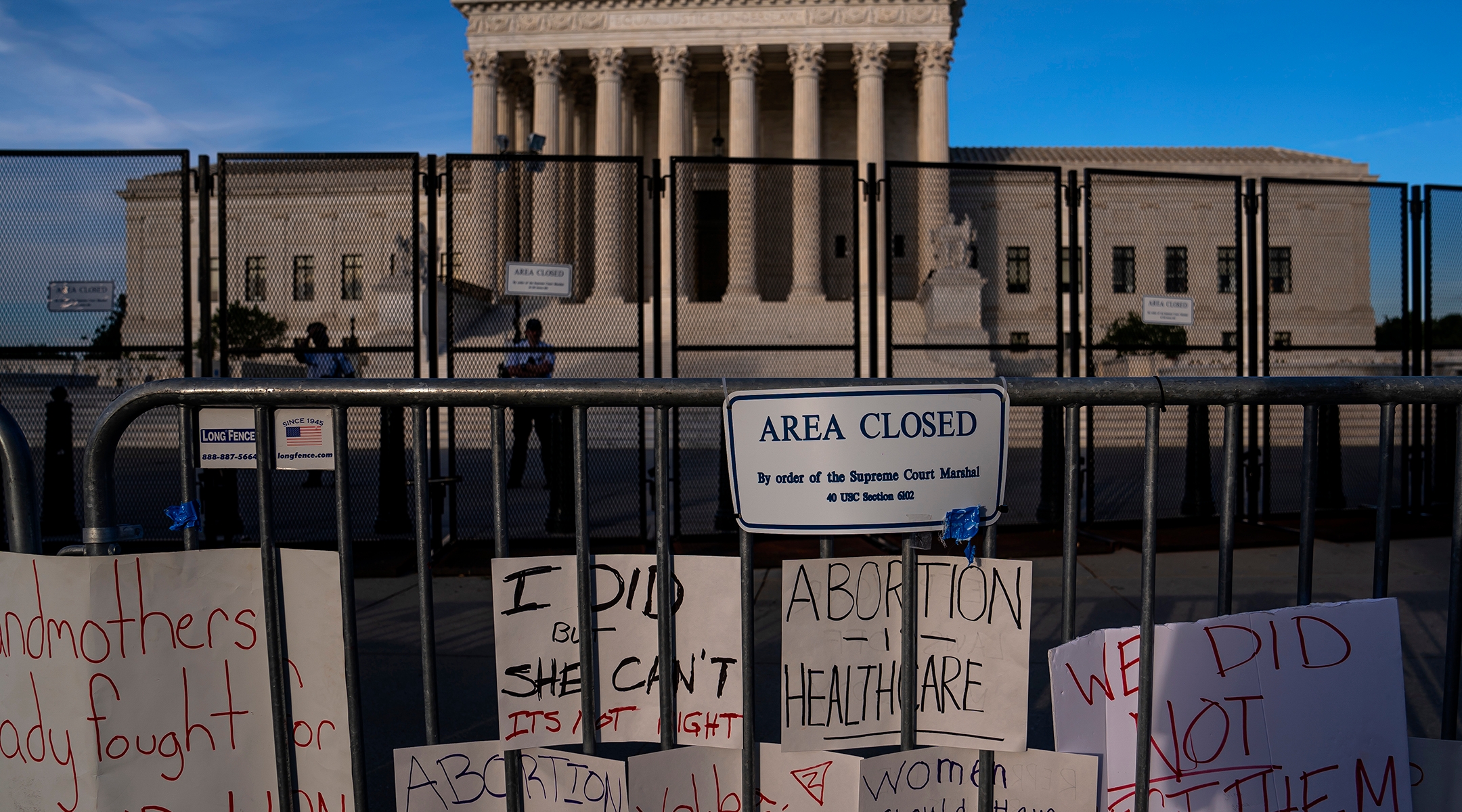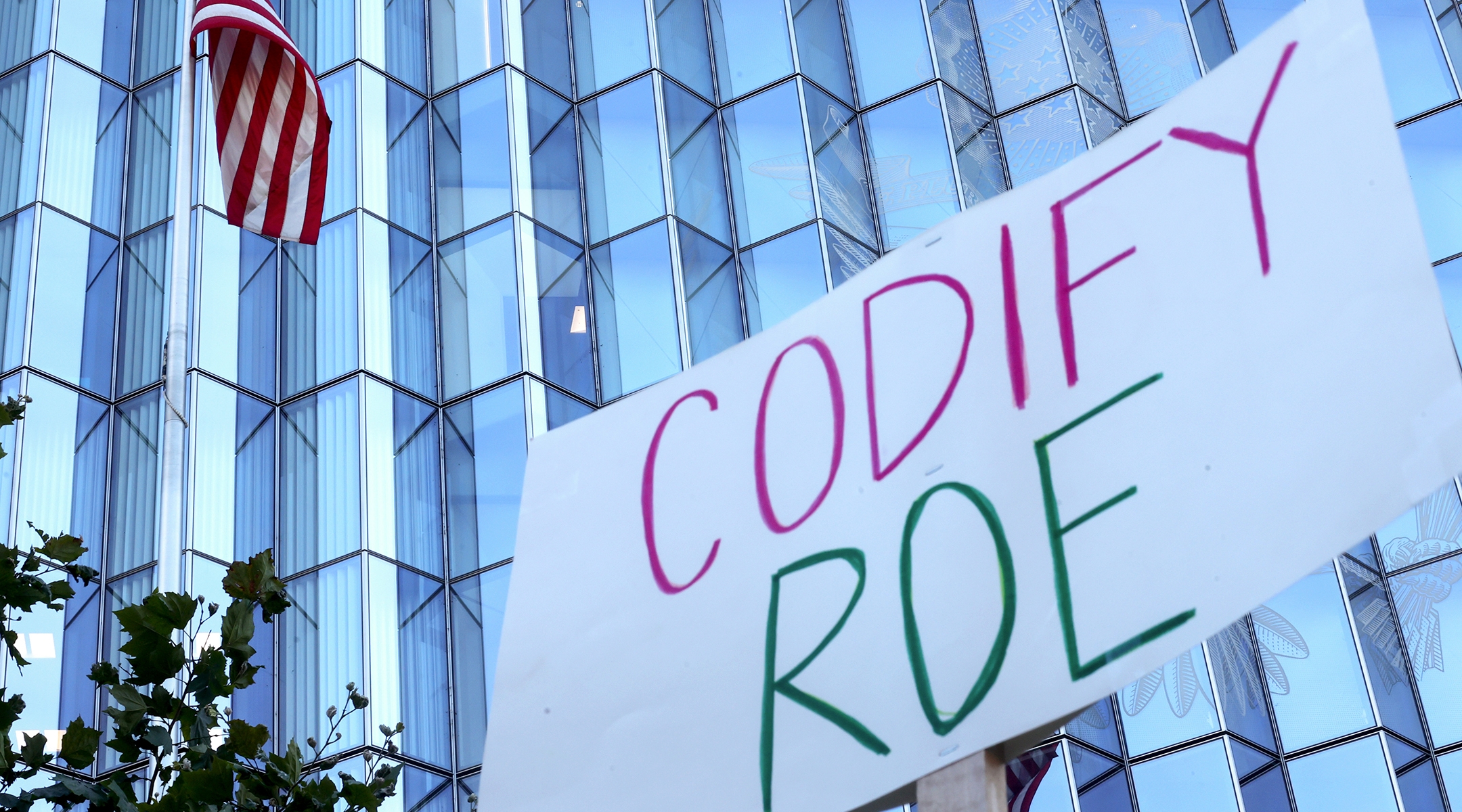Leading Orthodox groups cheered the end of Roe v. Wade. Many Orthodox women are panicking.
The reversal is lighting up online private forums for Orthodox Jewish women, one activist said. “It’s chaos.”

Signs left by abortion rights supporters line the security fence surrounding the Supreme Court in Washington, D.C., June 28, 2022. (Nathan Howard/Getty Images)
WASHINGTON (JTA) — Pam Scheininger and J. David Bleich have this much in common: They are Orthodox Jews who are preoccupied with Jewish ethics and teach at New York City law schools.
But when Scheininger looks at an American map, she sees 16 states where Orthodox Jewish women would not be able to have an abortion otherwise sanctioned by Jewish law. Bleich sees a different number — zero.
Disagreements among Jews over where Jewish and state laws intersect on abortion, once theoretical, have taken on urgency in the wake of the U.S. Supreme Court’s ruling this week overturning Roe v. Wade, the landmark 1973 court decision that enshrined a woman’s right to an abortion.
The differences of opinion are especially acute among the Orthodox, where there is a yawning gap between a faction that says the reversal of Roe v. Wade has triggered a crisis that will put the lives of women at risk and another that welcomes the decision as life-affirming and aligned with traditional Jewish values. The latter position comes as Orthodox groups have in recent years drifted politically to the right.
“Society, through its laws, should promote a social ethic that affirms the supreme value of life,” Agudath Israel of America, the umbrella body for haredi Orthodox groups, said in a statement welcoming the reversal of Roe v. Wade. “Allowing abortion on demand, in contrast, promotes a social ethic that devalues life.” The phrase “abortion on demand” irks many, included among the Orthodox, because it is seen as diminishing the thought that goes into the decision, and because even under Roe v. Wade, there were abortion restrictions.
Orthodox groups have yet to address how they will reconcile situations in which halacha, the body of Jewish law, mandates an abortion, and a state forbids it. There is already chatter in Orthodox online forums and on social media, about setting up a network for Orthodox Jewish women in states where abortion is banned to travel to places like New York, where it is not.
Bleich advanced the proposal on Torah Musings, an Orthodox ideas exchange, after the court decision was first leaked in May. A number of Orthodox Jewish women already are pushing back, saying such a system would be impracticable and would compound the trauma of having an abortion.
The Agudath Israel statement said that abortions mandated by Jewish law are “extraordinary, rare exceptions to the rule that fetal life is entitled to protection.”
Bleich, a rabbi and professor of ethics at Yeshiva University and its law school, Cardozo, said those exceptions do not contradict any state laws.
“As of today, I do not think there is a single state which forbids abortion when the mother’s life is at stake,” Bleich said, adding, “I think district attorneys are smart enough not to bring a course of action” when a fetus threatens the life of a mother.
Scheininger, the president of the Jewish Orthodox Feminist Alliance and a court attorney referee who teaches law at the New York College of Technology, said prosecution was inevitable, in part because some laws were vague and did not account for health threats short of imminent death, which would be considered under Jewish law. Halacha includes exceptions for mental health, and some states do not; Georgia explicitly excludes it.
Orthodox Jewish women are going to have those who assist them in getting an abortion “prosecuted for availing themselves or trying to avail themselves of halachically required abortions,” she said.
“It’s that simple,” she said. “It’s going to happen and women will die.”
The Orthodox Union, the umbrella body for the Modern Orthodox, has sought to straddle the divide.

A sign reads “Codify Roe” as abortion rights supporters protest outside the First Street U.S. Courthouse in Los Angeles, June 27, 2022. (Mario Tama/Getty Images)
“We cannot support absolute bans on abortion — at any time point in a pregnancy — that would not allow access to abortion in lifesaving situations,” it said after the decision came down. “Similarly, we cannot support legislation that does not limit abortion to situations in which medical (including mental health) professionals affirm that carrying the pregnancy to term poses real risk to the life of the mother.”
Nathan Diament, the Orthodox Union’s Washington director, said his group and its state offices were conducting a review of the state laws before considering further action, including lobbying for changes to laws. It’s already clear, he said, that the laws will trigger litigation, although he could not say yet if his organization would join any such lawsuits.
“Most of the legislation that’s out there has some sort of physical health and other health exception, but because of how dramatic the changes are because of the Supreme Court, there still needs to be implementation by each of the states,” he said. “It’s going to be a long haul.” He predicted that the Supreme Court would soon have to resolve the issue again.
Indeed, there have already been reports of confusion and fear among the physicians who provide abortions because so many of the state laws are written vaguely.
Rabbi Abba Cohen, Agudath Israel’s Washington director, also said it was early days.
“We are currently having internal discussions about the matters you raised and other matters related to the overturning of Roe,” he wrote in an email. “We are also waiting to consult with our rabbinic leadership.”
Outside of the Orthodox sector, most Jewish organizations, which trend politically liberal, have said they will act to oppose abortion bans. And within three days of the Court’s Dobbs v. Jackson decision, Israel loosened its already liberal abortion regulations.
The Orthodox establishment may soon come under pressure to make clear what steps it will take to protect women who need an abortion. Shoshanna Keats-Jaskoll said the reversal was lighting up online private forums for Orthodox Jewish women.
“It’s chaos,” said Keats-Jaskoll, a co-founder of Chochmat Nashim, which means “the wisdom of women,” a group that advocates for better female representation in Orthodox decision-making.
The gap within the Orthodox Jewish community, Keats-Jaskoll said, is between women who have had abortions or who have at least contemplated them, and the men who she says have no idea what goes into contemplating an abortion.
“The perceptions of who gets abortions versus who actually gets abortions are really far apart,” she said. “I think some people have no idea who actually ends pregnancies. There are people thinking willy-nilly, a woman’s waking up at 39 weeks saying, ‘I decided I changed my mind.’”
Keats-Jaskoll shared an account posted to a private forum from a woman who had an abortion in 2001, in New Jersey, which allows abortions in cases where the fetus is not likely to survive childbirth.
“At 21 weeks we found out there were multiple significant deformities,” the woman wrote. “The baby could survive in utero but could not live long outside of the womb. He would be poked and prodded and subjected to many treatments … but would die anyway.”
The woman, who consented to Keats-Jaskoll sharing the account as long as she remained anonymous, said she and her husband consulted with a rabbi, who advised them to consult with a posek, an arbiter of Jewish law.
“The posek said that to save mother and baby suffering, the pregnancy should be terminated,” she said. “Had the law been different, I may have had to carry that fetus to term, deliver and watch it die. I don’t know that we would have gone on to have more children if we’d had to endure that. It was traumatic enough as it was. People don’t understand how often this happens, who actually needs to terminate and how changing the laws even with exceptions they approve of is cruel.”
A 2018 article in the Forward by Avital Chizhik-Goldschmidt, a writer and a rabbi’s wife, aggregated anonymous accounts she had gathered from Orthodox Jewish women of why they had an abortion: Some had been raped, some were in abusive relationships, some had life-threatening pregnancies, some fetuses would not have survived long after childbirth, some women were contemplating suicide.
The article was circulating among Orthodox women after the decision, which Keats-Jaskoll said was typical. “It gets shared every time abortion comes up,” she said.
The proliferation of such stories illustrates the gap between the Orthodox establishment and Orthodox women, who are infuriated when they see organizational officials decry “abortion on demand,” a phrase Agudath Israel used in its statement.
“Most cases where a woman needs an abortion are devastating and necessary,” said Sara Hurwitz, the president of Maharat, the first institution to ordain Orthodox women as clergy. She called the Dobbs decision an “unconscionable infringement on the religious freedom of Orthodox Jews” in an op-ed for the Jewish Telegraphic Agency that she co-authored after a draft opinion leaked in May. “It’s not like a decision that is ever taken lightly. And I think that the assumption that women are just having abortions for the sake of having abortions is not true.”
Keats-Jaskoll, who is Israel-based and is busy engaging online with American Orthodox Jews who support the Roe reversal, says just seeing the phrase “abortion on demand” makes her livid.
“Abortion on demand. What does that mean?” she said. “They don’t know. They don’t know what they’re talking about. This is what happens when people who have no idea what they’re talking about pick up a cause and start to vomit from their mouths.”
She blamed the politically rightward drift among American Orthodox Jews, which she said was distorting what had once been nuanced, deeply researched and considered opinions on matters of Jewish living.
“I think they want to be identified, you know, as right-wing,” she said. “They want to be identified with the more religious, and in America religious is Christian. Christianity holds very different views on abortion.”
Bleich’s proposal of a fund to get Orthodox women to liberal states was unviable, said Keats-Jaskoll, Hurwitz and Scheininger. Bleich proposed a “stipend to be limited to women who produce a statement signed by a recognized posek attesting to the halachic propriety of the procedure.”
Scheininger said the burden of proving need would be overwhelming. “Having them go and perhaps show financial need and gain access, in some cases to financial documents that they may not have may or may not have access to, if their spouses have control over that or if their father, their parents have control over it,” said Scheininger. “And to then ask for money and then to make those travel arrangements and to get to that state. You know, you’re talking about so many levels for a woman who’s already living trauma.”
Hurwitz said a system that only accommodated Jewish women was inherently inadequate.
“I think the Jewish community may have more means to support and help people who need abortions, but I think I’m worried about the whole system and the people who are really going to suffer because it’s not financially feasible,” she said.
Bleich said he did not believe his proposal would ever be needed; prosecutors were reasonable, he said, even in a state like Georgia where there is no mental health exception.
“I don’t think any district attorney, even in Georgia, would bring a cause of action against the doctor who claimed that his patient’s life was threatened because of a mental condition,” he said.
Scheininger, who like Bleich, teaches in a law school, said that was wishful thinking.
“If there’s a law on the books, then the prosecutors are going to prosecute,” she said.
This article originally appeared on JTA.org.















